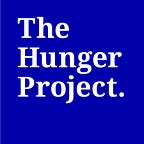Access to Information Promotes Economic Security for Women
By Mary Tiffin, Global Communications, The Hunger Project
Access to information unlocks a world of opportunity. Information allows individuals to address the underlying and systemic challenges that are keeping chronic hunger in place — challenges like malnutrition and health, economic insecurity, food insecurity and gender inequality.
Over the next six months, we at The Hunger Project will be exploring what’s possible when communities living in hunger have access to information. This campaign will culminate with our participation at Women Deliver 2023 in Kigali in July. We are proud to be a sponsor and supporter of Women Deliver 2023, one of the largest multi-sectoral convenings to advance gender equality, and look forward to gathering with our colleagues to advance women’s rights globally.
All women and girls should be freely able to participate in their local economies should they want to earn a wage, start a business, open a savings account and more. However, economic inequality exists in all levels of global society due to institutional and structural barriers.
UN Women reports that more than 2.7 billion women face legal restrictions that prevent them from working and thus limit them from having the same rights and opportunities as male workers.
Meaningful access to the internet can provide economic resources and opportunities to women that would otherwise not exist, such as opening a bank account on a mobile device or starting an online shop. However, according to a global report from the Web Foundation in 2021, men are 21% more likely to access the internet than women, and this figure increases to 52% in low and middle income countries. To ensure their economic security, women need unrestricted access to the information that is widely available in the public sphere, online and in their physical communities.
At The Hunger Project, we are working directly to bridge the digital divide in rural communities. For example, in Chiapas, Mexico, we launched the Digital Basket project with Microsoft to expand equitable opportunities and digital inclusion for indigenous communities. This project promotes meaningful, inclusive information access to promote equal economic opportunities for underserved groups, like indigenous peoples and women.
In India, we work with women elected to local village councils, known as gram panchayats, to grow their leadership skills and ability to navigate the government bureaucracies so that their constituents have full knowledge of, and access to, employment schemes. Social norms often prevent people from taking advantage of these opportunities, so the elected women take it upon themselves to do significant outreach within their communities to ensure that even the most underserved people have the information they need.
The exchange of information in local social networks is also a valuable tool for women to gain new economic opportunities. For example, if the price of fruit at one market is more affordable than another, women can share this information with each other which can impact their budgeting and spending. By empowering women to share information collectively their self-determination for economic growth will increase.
Global partnerships need to give women the tools necessary to create and participate in free and inclusive economies. The Hunger Project is working with Eurofins on another project in Mexico that addresses this issue. We are teaching indigenous female elders and leaders about financial topics that can help empower young women and girls to pursue economic opportunities. From transformative leadership to entrepreneurial mindsets, this community-based program is uplifting local voices and networks of women to share valuable financial training information, promoting widespread economic growth and security.
The safe exchange of information is vital for the promotion of equal working opportunities for women and girls. Through similar community-led programs, we can create inclusive environments for women to participate in both local and digital economies.
Mary Tiffin is a Global Advocacy Communications Intern. She is pursuing her Bachelor’s Degree at Seton Hall University.
The Hunger Project is a global development organization that transforms the systems of inequity that keep hunger in place.
